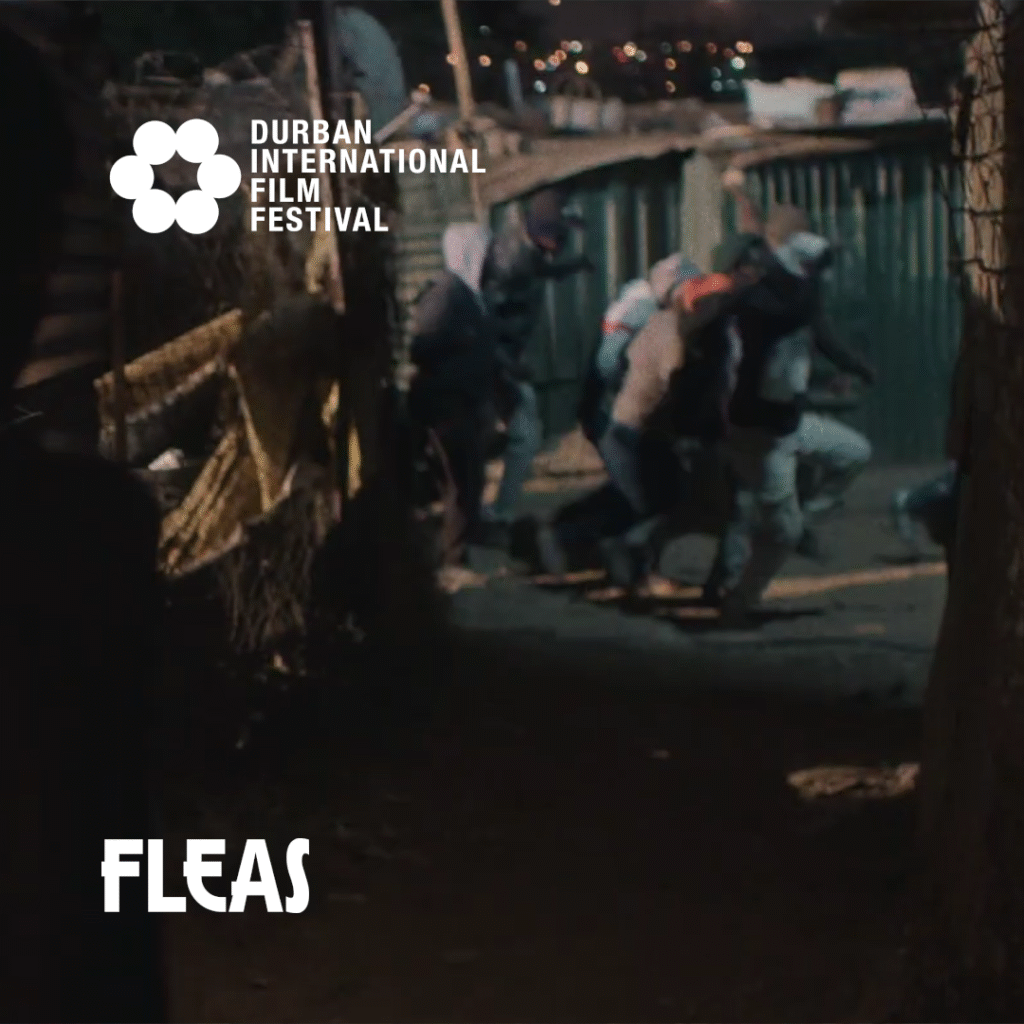by Riley Hlatshwayo
June 11th, 2025
Jordy Sank’s short film, Fleas, does not only shed light on the country’s xenophobia and consequent obsession with the persecution of foreign immigrants, but also how dehumanisation breeds the ground for unchecked violence.
The film tells the story of two Zimbabwean brothers, Tonderai and Panashe, who live in a South African township. On this one tumultuous night when the township is wrought with xenophobic activity from the townspeople profiling and attacking foreigners, they find themselves anxiously awaiting for their mother to return from work. It doesn’t take much for the audience to fear the worst, to ask the question the brothers dare not say aloud: Has something happened to her? Bedridden from sickness, Tonderai’s little brother becomes desperate for drinking water, forcing the little boy to brave the dangers of outside to get them for him as they have run out.
Written and directed by Talents Durban alumni, Jordy Sank, and produced by Gabriella Blumberg, Fleas (otherwise titled Amazeze) puts the audiences in the shoes of foreign immigrant children—played by Brandon Matizanadzo and Kupakwashe Makhunyana—who are blameless victims. It is a very claustrophobic film that utilises the constricted location of township ghetto life to highlight how poverty and wanting leads people into succumbing to their darkest vices. The cinematography and set design play an imperative role in sending the message of desolation and desperation across, with tight shots of Matizanadzo’s character as he ventures into the communal amenities to get water. An unintended tour guide into the perilous crevices of township life, Tonderai walks about the place with an empty bucket in his hand and an air of fear and danger walking beside him. There is very little space for him to breathe and navigate this world he’s used to. On this night when danger lurks in the corners, any turn he makes could cost him his life—and Rick Joaquim’s visuals echo that in how they move about with this boy, the only time they pull back to create a sense of location, we are reminded of his predicament by the darkness that engulfs him.
As Tonderai continues on what would normally be a short endeavour, he experiences microaggressions from his neighbours that are exacerbated even further the more people look at him, profile him, and decide that he is a danger. Sank’s use of Tonderai as a vehicle for this narrative drives the message home: not even children are immune to hate. While the dialogue could have used some more workshopping, bordering on stereotypical depictions and language too vulgar to be taken seriously, it can be forgiven because the message has already been received. Warren Masemola’s character Sizwe, a figure reminiscent of Operation Dudula’s Nhlanhla Dlamini and his vigilante taskforce, goes on a tangent about foreigners being fleas sucking the bloods of those born in the country. He echoes the words of another character, played by Gcina Mkhize, who had said that foreigners steal employment and other opportunities from deserving South Africans—a rhetoric that is unfounded and continues to find prominence in xenophobic spaces. However, it is the dehumanisation of a population that breeds the most violence. I am reminded of an episode in the third season of a Netflix television series titled Black Mirror, where soldiers are sent to carry out missions to eradicate a town of feral mutants called roaches. These missions are carried out successfully until one of the soldiers faces a roach head-on and his technological gear is tampered with—we are then shown the true vision of these roaches: normal people on the other side of the war. We are made to understand that the enemy had to be made monstrous for the soldiers to be able to attack without question. In dehumanising them, they no longer resemble us, so any violence against them becomes warranted. Sank’s film reminds the audiences of that violence, of the likes of Sizwe, so bloodthirsty and full of hate that he would be moved to execute a child.
What does it mean to live in a world blatantly ready to burn a child? A world that renounces a person’s humanity simply because they were not born in the same country? How have we been royally-screwed over that our desperation and need prevents us from seeing that other people are just as desperate and needing?
Jordy Sank’s Amazeze is a raw and confrontational film that holds a mirror to society’s moral failings, and forces them to look at themselves at the scene of a crime perpetrated by a hatred-fuelled mob. In the creative and technical decisions they made, from the impeccable set design that sees Makhuyana’s Tonderai lying on an unkempt bed with Jesus on the cross hovering over him and a cardboard cutout with the words “Do not open” written in bold; to the writing and story team using these images to heighten the tone of faith and religion, and danger respectively, and metaphors and messages around the use of searching for water putting one in danger. How does this thing that gives life send one to their impending death? And how an act of love and caretaking ushers us into the unjust and violent experiences of foreign immigrants.
It is a brilliantly shot and edited short film of socio-political importance. A film loud in its reminder to look for the humanity in ourselves in order to see it in another person, and to have the empathy to acknowledge our failings as our own instead of blaming it on others.
Catch the film at DIFF: https://ccadiff.ukzn.ac.za/diff46/fleas/
Screening Schedule:
20 Jul 14:00 Suncoast 6
27 Jul 14:15 Watercrest 1
2 Aug 14:30 The Labia
2 Aug 14:30 The Bioscope
This review emanates from the Talent Press programme, an initiative of Talents Durban in collaboration with the Durban FilmMart Institute and FIPRESCI. The opinions expressed in this article are those of the author (Riley Hlatshwayo) and cannot be considered as constituting an official position of the organisers.

